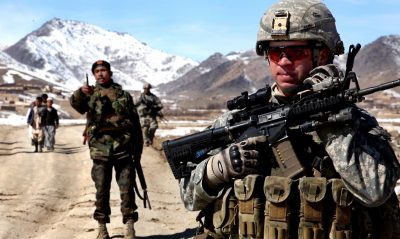Afghanistan: Will U.S. Finally Withdraw?

Al Jazeera reports Monday: “Afghan intelligence officials killed in Taliban car bombing.”
He said today: “With the recent spate of attacks in Afghanistan, the so-called ‘peace agreement’ between the U.S. and the Taliban signed just a few weeks ago seems to be in tatters. The purported truce that was to be had went to shreds the moment the negotiations ended in some resolution. The only provision that seems to have been implemented is a prisoner exchange.
“After dragging its feet” in the prolonged war, the U.S. government “was now willing to meet the principal Taliban demand: withdrawal of all U.S. forces, gradually over the next fourteen months. However, the absence of, and indifference toward, the Afghan government itself was glaringly visible in these U.S.-Taliban peace talks.
“Observers now widely believe that an Afghan ‘puppet’ government, utterly reliant on U.S. protection, is outraged by these negotiations. President Ashraf Ghani of Afghanistan, along with his close Indian allies, do not seem to be keen on any U.S. withdrawal that would almost certainly lead to the Taliban, or what is more appropriately considered the ethnic Pashtun resistance in Afghanistan, to win over both more territory and loyalties from the other ethnic forces in the country. The latter has already begun to happen.
“The latest Taliban attack on Afghan intelligence personnel in the city of Ghazni rests upon a strong belief that the Afghan intelligence services, alongside their Indian counterparts, are engineering a number of spectacular attacks within the country precisely to prevent the Americans from considering to withdraw. All of the attacks are routinely condemned by the Afghan government as the work of the Taliban, who on the surface of it, would have no interest in breaking the truce and peace accord since the Americans agreed to their main demand.
“What began as a hopeful sign of the ending of the two-decade bloody American occupation of the country, torn by internecine warfare for four decades now, has now (re-)turned into a chaotic war zone where the geopolitics of the region, and outside actors, prevent any steps toward reconciliation and peace.”
*
Note to readers: please click the share buttons above or below. Forward this article to your email lists. Crosspost on your blog site, internet forums. etc.
This article was originally published on the Institute for Public Accuracy.
Ahmad is director of the Center for Global Dialogue and professor of Middle Eastern politics at the University of Lahore, Pakistan. See his interviews on The Real News.

